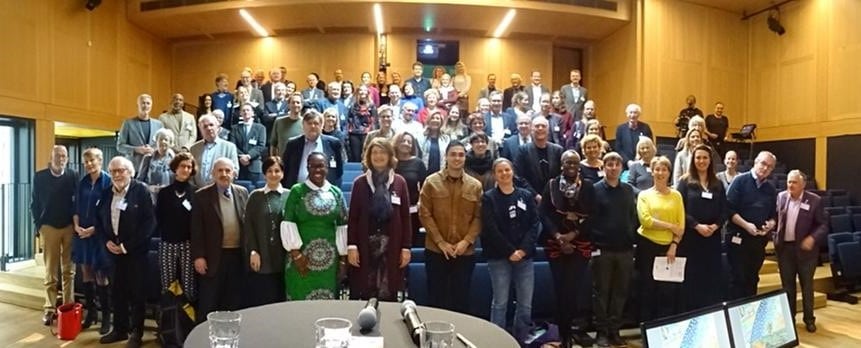SUMMARY OF DAY 2
“Evidence, arrogance, ignorance, eminence”. How do you find the optimal balance for better treatments and quality of life? That is the central theme of the annual Inspire2Live congress, which was kicked off on Wednesday January 29. We kick off day 2 of our Annual Congress with a warm welcome by our conference chairs Becky Malby (London South Bank University) and PiarellaPeralta (Inspire2Live).
Speakers (and what they were talking about)
Wim Saarloos, Linda Burger
President of the KNAW Wim Saarloos welcomes us at in the renewed KNAW building and tell his personal story
Patient advocate by necessity Linda Burger (I2L) talks about the contribution of eminence in research to cancer patients. Linda Burger, nurse, manager outpatient ward at AMC, is struggling with metastased breast cancer. She shares her personal story with us: I am the specialist in my own life, you, the doctor, are the specialist in illnesses and treatments. Together we make the decisions. Linda is also upgrading the appointment system at her own hospital. She ends her impressive talk with these words: “I hate my sickness, but the experiences it has given me, I wouldn’t miss for a million”.
Bob Weinberg
Bob Weinberg (Whitehead Boston Institute): Cancer is the most complicated diseases, the mechanism of cell growth is extremely complex, containing hundreds of molecules. And only a very small part is actually understood. Cancer develops from its early stages in many steps, and this takes decades. For example we don’t understand how children can get cancer. Research is making progress, but cure development goes slow. Prevention is much more effective. That’s the realistic message from science
Olufunmilayo Olopade
Olufunmilayo Olopade (University of Chicago) Breast-cancer risk assessment and individualized treatments. An additional tool to improve screening and detection, more effective than all-out screening: She has researched into stratification of risk.
Rapid fire talks of participants
What happened in my life or my organization? What did I realize and how did I do it? In presentations of 3 minutes and 1 slide at the max inspirational participants talk about their way of refurnishing the organization, they are part of.
Elroy Aijal from HungerNdThurst tells how he as a kid had to have his first chemo. He learned about taste alteration at this time and that’s why he joined HungerNdThirst to help make the change especially for kids. Change starts with yourself!
Cathelijne Ziedses des Plantes from Zilver Kruis. Her personal hero is her grandfather who worked to change healthcare. That’s her inspiration. How research into the number of operations for prostate cancer has finally led to a standard of more than 100 operations a year.
Hrispsime Martysosyam from HENERAN. She tells how in Armenia in spite of very low organization-grade patient advocacy is succeeding to organize itself and is taking the lead nationally and also in the Armenian diaspora elsewhere in the world
Sandy Krijnen from SandyMoveS tells us she has MS. She wrote a book about this and what a Healthy lifestyle can do for you. Also, to her the name patient is a victim’s label. The name Mover would be so much better.
Robin Koops from Inreda Diabetic. He works on a scientific research project into Patient Sciences. With a point of view from patients instead of that of the specialist.
Omolola Salako from Nigeria is 1 of 80 radiation oncologists in Nigeria (population 200 million). Patients appear at the clinic in very late stages. So she spends a great deal of time not only on patient care but on community care. In her hear she is a community oncologist.
Tatiana Romanyk on the very limited use of heat therapy, and her efforts to get this into practice in more hospitals. Her drive comes from her best friend who had breast cancer. That’s how she how she learned about hyperthermia helping to increase survival from 27% to 51%.
Fabrizia Stavru from Institute Pasteur is a researcher. Until tomorrow. Then she becomes a patient that will get chemo therapy. She has a rare form of cancer. She tells us about her efforts to get patient data of very rare cancers to be available to science.
Stephen Friend consistently progresses projects to use open wearable devices and systems to collect medical data, in a for research available environment with sufficient protection. Follow-on will be personalised feedback of signals gathered from someone’s data to theirself.
Conradin Döbeli from Colowntown has a special rare cancer. He is “hacking” into data and information about his cancer and how hard it can be to get data to work with.
Out in the city
In the afternoon groups went out in breakout sessions in Amsterdam. They use the locations as an analogy and inspiration for their conversation on ‘What is possible?’ and ‘What can be done?’
We had groups visiting the VUMC on the topic of Surgery without incision. At Frame Therapeutics we talked about vaccines against cancer. At IQVIA we spoke about combining artificial intelligence & real-world evidence. Another group got a workshop organized by Amsterdam City. And we spoke about eco-oncology and how you can apply ecological principles to understand and manage cancer. We ended the day with a report back.

